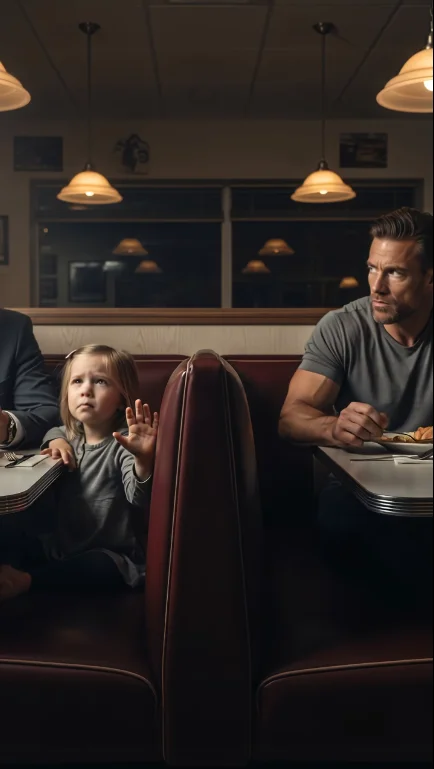A fly pressed itself flat against the windowpane, its wings vibrating in a tiny panic that seemed to echo the tension in the diner. The late afternoon sun slanted through dusty glass, the beams cutting across empty booths and cast‑offs of a half‑done cleaning. Outside, the highway stretched straight to the horizon, a muted ribbon disturbed only by the distant rumble of a passing semi.
Ethan Walker eased his duffel bag onto the bench of a worn leather booth. He wasn’t hungry, but he needed a pause. The uniform was gone, but the posture remained: back straight, every muscle alert. He ordered a ham sandwich and black coffee. The words “thank you” came out soft, almost swallowed by the hum of quiet.
Kansas had once been home, before a slick winter morning on Highway 54 stole everything. At seventeen, after the accident, he enlisted—trading one kind of emptiness for another. They say time heals, but soldiers know differently. You don’t heal—you learn to carry the wound without letting it bleed outward.
Across the diner, behind a brittle potted cactus, sat a small child—three or maybe four years old—dressed in pale blue. She remained unnaturally still, her gaze drifting past the faces in the room, never stopping long enough to be seen in return. Next to her, a man in a gray suit absorbed himself in a thick, titleless book, his body rigid, his attention indifferent to the child beside him. He hadn’t touched her, nor spoken a word. It felt wrong.
Margaret Chen, the diner’s owner, glided behind the counter, wiping a coffee machine with slow precision. She glanced in the direction of the booth, her eyes narrowing just enough for Ethan to notice.
He didn’t look back at the girl—didn’t need to—yet he sensed she would glance again. And she did. Her eyes flicked toward him, tension in their depths. Her right hand lifted, trembling: fist, open. Fist, open. Fist, open.
S.O.S.
In that silent signal lay all the danger, all the hope. Ethan’s heart tightened. She was asking for rescue.
Moments later, Margaret approached with his sandwich. Her voice was low. “Need sugar, hon?” But her gaze lingered on that corner booth. She had seen it too.
Ethan shook his head. He watched as a young boy—Margaret’s grandson—zoomed past, toy car trailing across the floor. The girl flinched. The man’s eyes flicked up, cold and sharp, and the boy froze. The tension spiked.
Ethan saw the SUV parked outside, engine idling, the back window partially concealed by a superhero sticker. It wasn’t childlike. It was deliberate. He felt the weight of that realization.
He rose calmly, walked to the counter, then back to his seat. His voice, when he spoke, was soft but firm: “That little girl in the corner—have you noticed her?”
Margaret’s lips pursed. “Sat there a while. Didn’t speak. Thought she was crying earlier… very quietly.” She cast a look toward the booth.
Ethan nodded once. He turned, facing the child more directly. She watched him. Her small fingers quivered. Then—again—her hand rose, curled into a fist, then opened. Fist, open. Fist, open. The plea was unmistakable.
He rose and walked over to their table, steps measured. The man looked up, expression flat. “Excuse me,” Ethan said, “I hope I’m not disturbing anything.”
The man’s smile was polite, empty. “What is it?”
“I was just wondering—she looks like my niece,” Ethan said, his tone casual. “Maybe she’d like one of these.” He set a small, foil-wrapped candy on the table. “They were her favorites.”
The child’s eyes shifted: candy to man, man to candy, back to Ethan. She stretched a trembling hand forward.
Before she could touch it, the man’s arm jerked out. His hand struck her wrist with a sharp smack. The girl jolted, retracted her arm as though stung.
“She’s allergic,” he snapped, voice low but fierce. “Don’t give her sweets without permission.”
The girl’s shoulders shook. She remained motionless, face rigid, eyes downcast. Not tears—something colder.
Ethan’s heart pounded. “I—didn’t know,” he murmured, stepping back.
At that moment, Ethan turned and spoke just loud enough for Margaret to hear: “Call the police. Now.”
Margaret’s hands shook as she stepped behind the counter, dialing. Her voice was tight. “Rachel, it’s Margaret. There’s a little girl here signaling for help… I’m not sure what to do yet.” She passed the phone to Ethan.
“Sheriff Monroe?” he asked when the line clicked. “This is Ethan Walker. Former Marine. I believe a child here is requesting rescue via nonverbal signals. The man is controlling the situation.”
Sheriff Monroe’s voice was immediate, decisive. “Give me descriptions. I’ll send units. Don’t let them leave.”
Back at the table, the man stood abruptly, clutching the girl’s hand. “Let’s go,” he hissed.
Ethan moved between them and the exit. “Where do you think you’re taking her?”
“She’s my daughter,” the man declared. “Nothing to see here.”
“She doesn’t want to go with you,” Ethan said flatly. “I called law enforcement. They’ll arrive any second.”
The man sneered. “Over a candy and a glance? You’re insane.”
“I saw her plea,” Ethan retorted quietly. “And I won’t let you remove her from safety.”
The tension was a coiled spring until a siren’s wail sliced through the air. Red and blue lights flickered across diner walls. Sheriff Monroe burst in. “Stop,” she commanded.
The man released the girl’s hand. She did not move. Slowly, she rose and began walking toward Ethan. She approached with hesitant steps until her small frame stood before him.
“You’re my hero,” she whispered, barely audible.
Then she threw her arms around him, clinging as though he were the only solid thing in her world. He froze, unsure, then gently settled his arms around her, holding her trembling body.
Sheriff Monroe and deputies poured in. The last grains of control shimmered and snapped. The man—Cole—stood powerless now that law and light had entered.
In the station, truth poured out. Cole was part of a child trafficking ring. Lily, the little girl, had been taken from her mother nearly a year earlier when the mother attempted to escape. Cole, masked as a partner or guardian, had kept her hidden, silenced, isolated.
When Lily finally saw her mother in the visitation room, her eyes were empty. The trauma had erected walls. She did not run to her. She just watched, distant, as though the face staring back was a stranger.
In the courtroom, Grace—Lily’s mother—told her story with a trembling voice. Ethan testified about the S.O.S. signal, the candy ruse, the silent struggle. Evidence from a gas station video, Lily’s crayon sketches, even a live TikTok recording from the diner locked the narrative in place. Cole’s composure cracked; the jury returned a quick verdict. Guilty beyond doubt.
Afterward, Ethan prepared to leave. He thought he would walk away the same way he always had: alone. But Lily approached him in the lobby, silent, and reached into her pocket. She produced one red candy—the same kind she had tried to reach in that diner. She held it out to him.
“Can you fly?” she asked, voice soft as dust.
He shook his head. “No. But I was fast enough to catch you.”
She allowed a small, fragile smile. In the distance, her mother stood, tears in her eyes. A new man—a kind friend—stood beside her. They didn’t intervene. They understood this moment was between Lily and the soldier who had heard her silent plea.
Weeks later, Sheriff Monroe visited Ethan. “We’re opening a shelter for children like Lily,” she said. “We named it Red Flame, after that candy. We want you to stay—help guard the doors, protect the kids.”
Ethan looked at the long road beyond the window—the road he’d always meant to escape on. But then he thought of Lily’s hug, the weight of that candy in his hand, and the warmth in her whisper: “You’re my hero.”
He asked her, quietly, “Would it be okay if I stayed?”
Her grip tightened around his hand. “Don’t disappear,” she said. “Stay as long as you need.”
He looked at her, then at the road—then back. For the first time in a long time, he didn’t want to run.
In the quiet of Red Flame’s opening day, children’s drawings covered the walls. In the center was one of Lily and Ethan: a tall man in green, an arm around a small child in blue, holding a red candy beneath a bright sun.
He leaned down. “This—this is home,” he said softly.
She looked up and nodded.
And Ethan Walker, soldier once and wanderer, realized some battles are won not by taking ground—but by holding one small hand steady in the darkness.



